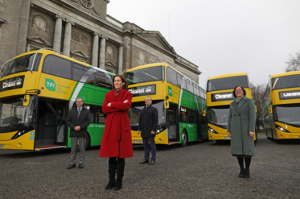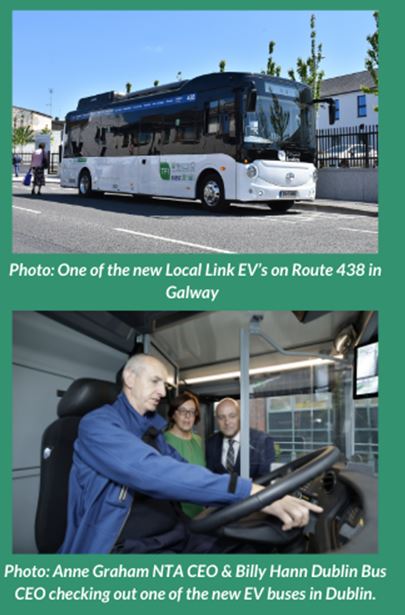Tosaíocht náisiúnta is ea aghaidh a thabhairt ar dhúshláin an athraithe aeráide agus cuirfidh BusConnects go mór leis an gcuspóir sin. Tá sé ríthábhachtach daoine a bhogadh ó ghluaisteáin go hiompar inbhuanaithe chun astaíochtaí CO₂ a laghdú agus dul i ngleic le brú tráchta.
Ina theannta sin, leis an aistriú chuig flít busanna uirbeacha íseal-astaíochtaí agus saor ó astaíochtaí, cuirfear le cathair níos glaine agus níos ináitrithe trí thruailliú ó thorann agus truailliú aeir a laghdú.
Tá tús curtha leis an aistriú sin chuig flít busanna uirbeacha cheana féin faoi BusConnects Bhaile Átha Cliath. Tá tionscadal leictrithe stáisiúin ar siúl chun luchtairí leictreacha iomadúla a shuiteáil i stáisiúin Chnoc an tSamhraidh agus Bhaile Phib don fhlít leictreach nua. Tá sé beartaithe go gcuirfear na busanna leictreacha nua i mbun seirbhíse oibríochta níos déanaí i mbliana (2023) de réir a chéile. Déanfar feithiclí díosail a mhalartú de réir a chéile agus busanna leictreacha a chur ina n-ionad seachtain i ndiaidh seachtaine thar thréimhse trí mhí.
Tarlóidh an t-aistriú deiridh chuig busanna uirbeacha saor ó astaíochtaí faoi chlár athnuachana an Rialtais, próiseas a cuimsíodh ar dtús i gclár BusConnects Bhaile Átha Cliath.
Faoin gclár deireanach sin, tá sé beartaithe ag ÚNI go mbeidh líonra bus uirbeach Mhórcheantar Bhaile Átha Cliath á oibriú ag busanna astaíochtaí ísle agus saor ó astaíochtaí amháin faoi 2032 agus ag busanna saor ó astaíochtaí amháin faoi 2035. Tá sé beartaithe ag ÚNI freisin go mbeidh feidhm ag tréimhsí aistrithe comhchosúla sna cathracha eile.
Is iad inbhuanaitheacht agus cathracha níos glaise bunchloch an chláir BusConnects. Mar thoradh ar fhlít nua de bhusanna uirbeacha astaíochtaí ísle agus saor ó astaíochtaí, mar aon le háiseanna rothaíochta feabhsaithe, úsáidfidh níos mó daoine modhanna iompair atá níos éiceabháiche don chomhshaol ar fud chathracha na hÉireann.
Tá grianghraf de bhusanna dhá urlár hibride inluchtaithe i línte le feiceáil thíos;

